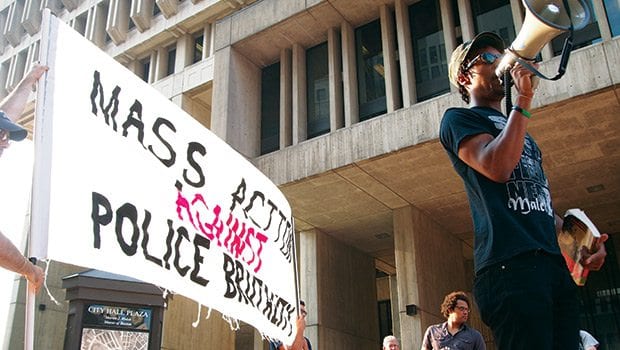Vargas “choking” incident inspires further calls for police reform
Mass Action Against Police Brutality holds protest

Members from Mass Action Against Police Brutality organized a protest on the Boston City Hall plaza Monday evening. Protestors called for Officer Ted Rivera to be fired as well as prosecuted for what they viewed as unwarrantedly aggressive conduct towards Elvin Vargas, a black teen who was put in an apparent chokehold by Rivera after shouting and swearing at officers. The incident was used as a jumping-off point for protesting overall police treatment of both unarmed blacks and the black community.
Tahia Bell-Sykes, one of the events’ organizers, emphasized the need to admit police fallibility. “Cops are human beings, they filled out an application. They were not ordained; this is not their calling. … You filled out a job application.”
“Every cop who kills an unarmed person should face the same [consequences] that you or I face,” MAAPB member Nino Brown said.
The video of the altercation between Vargas and Rivera has drawn over 80,000 views on Youtube. It shows Vargas (18) shouting “f– the police” and similar obscenities at plainclothes officers. One of them leads Vargas to a police car where the uniformed Officer Rivera arrests him on charges of disorderly conduct. When attempting to push Vargas into the car, Rivera wraps both hands around the neck of the shouting teenager.
Protestors also decried Mayor Walsh’s recent statement that the officer’s action did not constitute choking.
“If there was choking, he would not be able to speak,” Walsh told the Boston Herald. “I don’t know all of the particulars … but I don’t view that as choking.”
“If one of his [Mayor Walsh’s] children was grabbed by the throat, held by the throat, he would say it was a choke,” said Bell-Sykes.
Need for change
Brock Satter, an organizer of the protest, said the organizers aimed to raise awareness and to build a movement that would create enough political pressure to force the government to change how it does business. In the past year, efforts for change had been impeded by the lack of a mass movement, Satter said.
“There are so many people who say they want to help but don’t know what to do,” said Sirad Zarha, who spoke at the event.
MAAPB brings people together to share their stories, which serves as a starting point, Zarha said. She said that many people read about police brutality in a news blurb, but are not exposed to in-depth details from those who experienced it.
Satter said that little has changed since the death of Michael Brown in Ferguson, MO a year ago, but that the political climate was shifting, thus giving the “beginning of the possibility of some kind of change.”
Bell-Sykes said she believes one impediment is that Boston is unwilling to believe a problem exists: “They’re saying there’s no problem here so we don’t have to make a change. Community members are telling you there is a problem and you don’t want to listen because it doesn’t fit your agenda.”
Rahsaan Hall, Director of the Racial Justice Program for the ACLU of Massachusetts, said that while the police department had discussed implementing changes such as pro-active outreach to the communities and training initiatives, much remains to be done.
“People need to continue to speak out and register their discontent about police conduct, and the Boston Police Department needs to continue to move with meaningful reform. They need to adopt a body-worn camera policy, increase or improve racial bias training of officers [and] … increase their efforts to diversify the force.”
Hall said he had no idea why there was reluctance to implement body cameras, “especially when there are reports to show that there are significant reductions in incidents of police brutality and in complains of police brutality.” That an officer was using his camera to film during the Vargas incident underscores the need for the Boston Police Department to adopt the body warn cameras, he added.
Distrust
Distrust between black communities and the police was evident based upon conversations with MAAPB members.
“Clearly, he [Vargas] was being choked,” said Satter. “How badly he was being choked maybe you want to argue. [But] for Mayor Walsh to say he wasn’t makes him complicit. … He has a clear bias to cover up for the police.”
Bell-Sykes said the police are often the first to present their side to the media, allowing them to control the story. She believes that police often sought to escalate conflict when they should be diffusing it, and at times have seemed to be trying to intimidate the community.
The video taken of Vargas’s altercation with police also shows one plainclothes officer filming on his phone. Bell-Sykes said she felt that the officer filmed the neighborhood as a way of retaliating against calls for police-worn body cameras.
Bell-Sykes added that MAAPB holds meetings where, in order to encourage attendees to open up and feel safe sharing their experiences, they forbid police from attending. Although this prohibition against police is read at the beginning of each meeting, they twice discovered undercover cops in attendance, she said. When called out, the cops left.
Many MAAPB members had personal experiences where they felt unfairly treated by police. Satter said police once entered his home without a warrant, before saying that they had entered the wrong place by mistake, and that he had friends who had been killed by police. Brown recalled being stopped and questioned by police when driving home.
“How many of us see the flashing lights [of a police car] and almost have a conniption?” said Zarha. “ ‘What did I do?’ We can’t live like that.”






